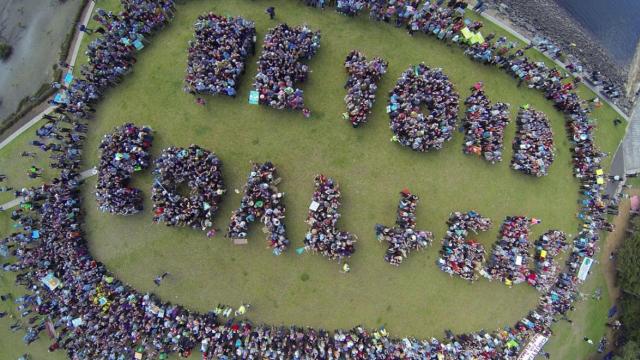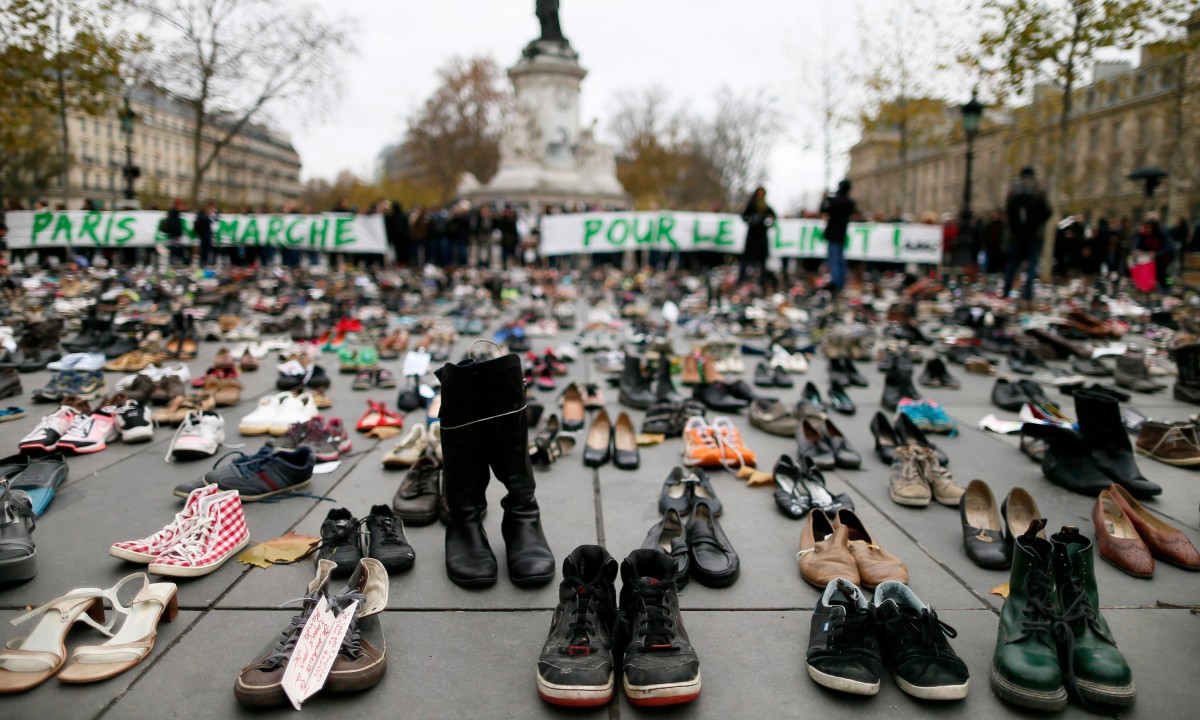
On May 3 some of the biggest ever global actions against climate change began, and are running for 12 consecutive days through Sunday, May 15. In North America there were protests and other acts of civil disobedience planned in the District of Columbia, Washington State, New York, California, Indiana and British Columbia.
The international actions, part of Break Free from Fossil Fuels, target a variety of issues in diverse communities – from protests by Ogani people in Nigeria to get their government to clean up “decades old oil spills,” to citizens in New Zealand trying to “shut down the operations of one of New Zealand’s biggest investors and lenders to the fossil fuel industry, ANZ bank." But the main message throughout is clear: we must act collectively to end humanity’s reliance on fossil fuels.
The actions so far have already led to 66 arrests in Australia, where “hundreds of kayaks and boats blocked the entrance to Newcastle harbor in an attempt to stop coal ships from leaving or entering,” along with another action to block train tracks “used to transport coal on the Sandgate Bridge in the city’s north west.”
But like many protest actions in recent years, there has been a news blackout on Break Free in the North American press, even those actions taking place in Canada and the U.S.
Of course, the media has long played a role in slowing progress towards dealing with the threat posed by human-driven climate change, including by giving equal time to those who deny the connection or, in some cases, that there is any such thing as climate change at all. Cable news is especially guilty, broadcasting as if there is still a debate on the issue despite the fact that the vast majority of climate scientists reached consensus about the threat posed by global warming years ago.
There are also at least two other major problems with these kinds of climate change debates. The first is that most of those who question the science of climate change are not scientists themselves but present themselves as “experts” anyway. James M. Taylor, of the ultra-conservative think tank Heartland Institute, explained his expertise as a climate change “skeptic" in the film “Merchants of Doubt”: “When I was in college I majored in government, I also took several atmospheric science courses and I also took several economics courses. I think that makes me pretty well positioned to bring together all the aspects of this debate: it’s scientific, it’s economic, it’s political.”
The second problem is that people aren’t required to have great public speaking skills to engage in scientific work, and this puts most scientists at a disadvantage when they’re pitted against pundits and think tank mouthpieces in televised debates. “Merchants of Doubt” demonstrated this using the example of James Hansen, a climate scientist who has been at the forefront of both the research and the call to action on climate change since the late 1980s, but has always been somewhat awkward in his public appearances. In an interview he made the point himself, saying, “Most scientists are not good communicators. We’re not trained to do that. Science itself is hard enough without trying to communicate with the public.”
In short: explaining the science is supposed to be the media’s job, not pretending to be “impartial” when dealing with facts versus fiction.
Wins and Losses
Despite the lack of coverage of Break Free and other climate protests in the press, there’s a lot to celebrate coming from the grassroots these days. New York state in particular has been at the forefront of protests against environmentally destructive fracking practices, with activist pressure helping put a stop to the proposed Constitution Pipeline that would carry shale gas fracked in nearby Pennsylvania. This decision followed on the 2015 ban on fracking in the state.
But despite some real victories stopping pipelines and other large projects where environmental degradation is almost inevitable, it doesn't mean the resources are all staying in the ground. Different methods are increasingly being used for fossil fuel transport, and shipment by rail seems to be the main alternative at this time, already with some tragic consequences.
With weakening global demand for oil, especially since Saudi Arabia began flooding the world crude market in 2014, North American fossil fuel producers have been suffering across the board – whether their end product comes from traditional oil drilling methods, tar sands production or fracking. As reported by Reuters, the number of energy companies going out of business in the U.S. “is closing in on the staggering 68 filings seen during the depths of the telecom bust of 2002 and 2003.”
Although oil prices have stabilized in the U.S. market with the Brent crude benchmark, now hovering around $45 a barrel, they are still half what they were just a couple of years ago, when prices of over $100 a barrel made expensive processes like fracking profitable, at least in the short term. The decrease in fracking should be a cause for celebration, but at the same time, many working people are losing their jobs in the process.
Coming Home to Roost
Lots of people are against fracking because of the chemicals used and their possible effects on groundwater. Less talked about, however, are the toxic effects of tar sands extraction, the main industry associated with Fort Mcmurray, in northern Alberta, where wildfires are currently raging. Shortly after the fires began it was reported that “those people living downstream (notably First Nations) have already chronicled the deformations of pickeral and walleye in Lake Athabasca, game animals and fish have been found covered with tumors and mutations and since the early naughts, there has been observed in humans cancers and autoimmune diseases in Fort Chipewyan.”
The devastating wildfires, which at least one expert at the University of Alberta believes were probably caused by people, may not be a direct result of climate change, it’s very likely they were made worse by it. It’s also somewhat ironic that the fires will themselves contribute further to the problem, pumping tons of C02 into the atmosphere as they continue to burn.
The past year has seen the rise of unprecedented political populism on both sides of the Atlantic, almost all of it focused on the economy and immigration (another issue driven, in some places at least, by climate change although this is rarely mentioned). In the U.S. presidential primaries, Sen. Bernie Sanders is the only candidate who consistently brings up climate change on the campaign trail, challenging the mainstream political narrative by unequivocally stating that it is the greatest threat facing the American people and the world.
As we recently learned, the energy industry has known about the risks and potential effects of climate change for more than 40 years. For this reason alone, Big Oil and Coal should be made to pay their fair share so the costs associated with climate change are not borne by ordinary people – as happened with the Wall Street banks that crashed the global economy in 2008.
The agreement reached in December at the climate summit in Paris gave some hope for the future because it showed that most of the world now recognizes the climate crisis we collectively face. But even the small success that this deal represents is subject to change if the political winds shift in favor of the anti-science, climate denier crowd, who remain especially powerful in the U.S. and Canada. How many more natural disasters must we witness before the "debate" about climate change ends and we see urgent, determined action? Break Free from Fossil Fuels is, it seems, just another beginning.
If you liked what you read and want to see more original reporting on Occupy.com, donate today!
3 WAYS TO SHOW YOUR SUPPORT
- Log in to post comments













